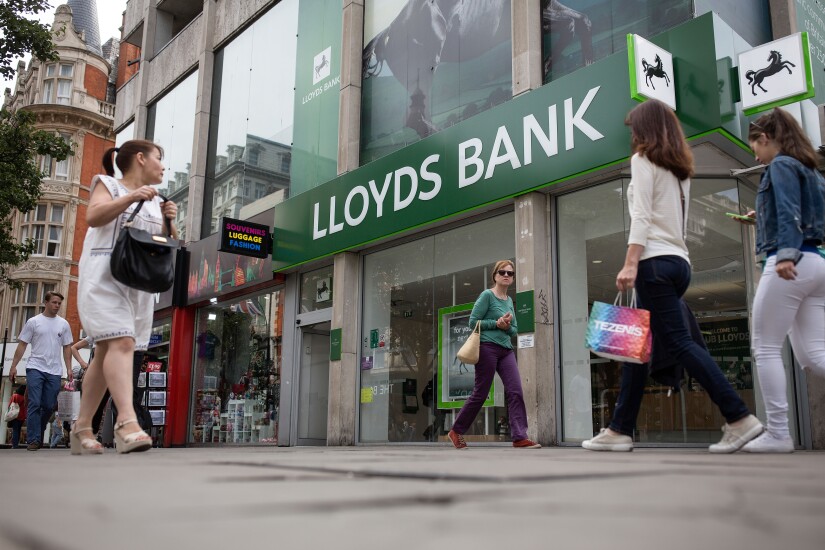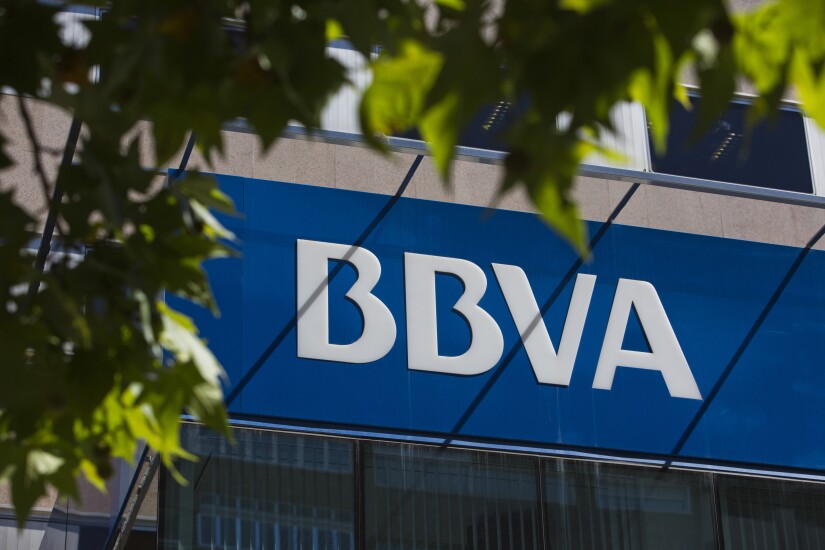Barclays is having a hard time selling parts of its U.K. payments business, while BBVA expands its stablecoin business in Switzerland. Here's what's going on in the world of payments.

Swift builds global system for multiple CBDCs
Swift will test different distributed-ledger models to vet their ability to process international transactions, initially using traditional currency and then moving to digital assets. It will then develop messaging standards for digital assets and determine what is necessary to provide scale for a large volume of payments.
The organization will initially focus on CBDCs, which are in development or testing in

Lloyds plans more branch closures
The closures will be spread among the holding company's brands, including 128 Lloyds branches, 119 at Halifax and 45 Bank of Scotland branches, according to
Branch closures are a controversial subject in the U.K., with politicians and government agencies regularly pressuring banks to maintain in-person access for cash-dependent consumers and small businesses.
In the U.K., the
"Three million people continue to rely on cash, even as digital payments become more popular. And many small businesses still need somewhere to safely deposit their takings each day," said Sheldon Mills, executive director of consumers and competition at the FCA, in a release.
The FCA has also issued guidance that requires banks and building societies to assess how closing branches or reducing hours will impact service. To maintain access to cash, the U.K.'s Link ATM network has developed

Barclays' UK payments sale going slow
Brookfield Asset Management pulled out of a potential sale,
Payment companies have

Revolut CEO sells $300 million of company stock
The U.K.-based challenger bank has its roots in mobile payments but in recent years has added
It has also expanded internationally, building a financial super app in competition with other challenger banks and fintechs such as Monzo, Block, Stripe and PayPal. —Joey Pizzolato, John Adams

BBVA boosts stablecoin support in Switzerland
Users can buy, sell or convert USDC to euros, U.S. dollars and other currencies. The bank hopes the move will speed trading by using the blockchain that backs USDC, which is
As a stablecoin backed by reserves of traditional currency, USDC hedges the volatility of other cryptocurrencies. Stablecoins are also considered a better option for payments among digital currencies given this backing.Among payment companies,

Church of England reports progress in digital giving
The Church has deployed contactless payment terminals at more than 2,200 churches and has worked with charitable organizations such as Give A Little, CollectTin and others. The Church made the move in response to declining cash usage in the U.K.

Sweden floats constitutional cash protection
The move would strengthen the government's ability to pass laws requiring merchants to provide a cash payment option and banks to accommodate cash protection in case of branch closures. Swiss bank regulations already protect cash as a payment method and the Swiss franc as the national currency.
Sweden is one of the world's most digital economies, with widespread adoption of digital banking and mobile wallets. That has led banks to de-emphasize cash services, which are largely outsourced to cash-handling firms such as Loomis.
The Riksbank contends this is not enough to ensure cash as a payment option, leaving businesses and banks inadequately prepared to use cash as a contingency and to provide service to people who choose or require cash.
In the U.S., states such as New Jersey and municipalities have passed laws requiring businesses to accept cash, a move that resulted in the

Contactless payments take over in Canada
Contactless cards make up 75% of contactless payments, through the penetration of smartphones will boost mobile contactless payments in the future. Seventy-four percent of smartphones in Canada are equipped with Near Field Communication, the technology that supports mobile contactless payments.
"Almost all debit and credit payment cards can now be used for contactless payments, and the penetration of contactless payment terminals is high among merchants," said Christie Christelis, President of Technology Strategies International, in a release. —John Adams





